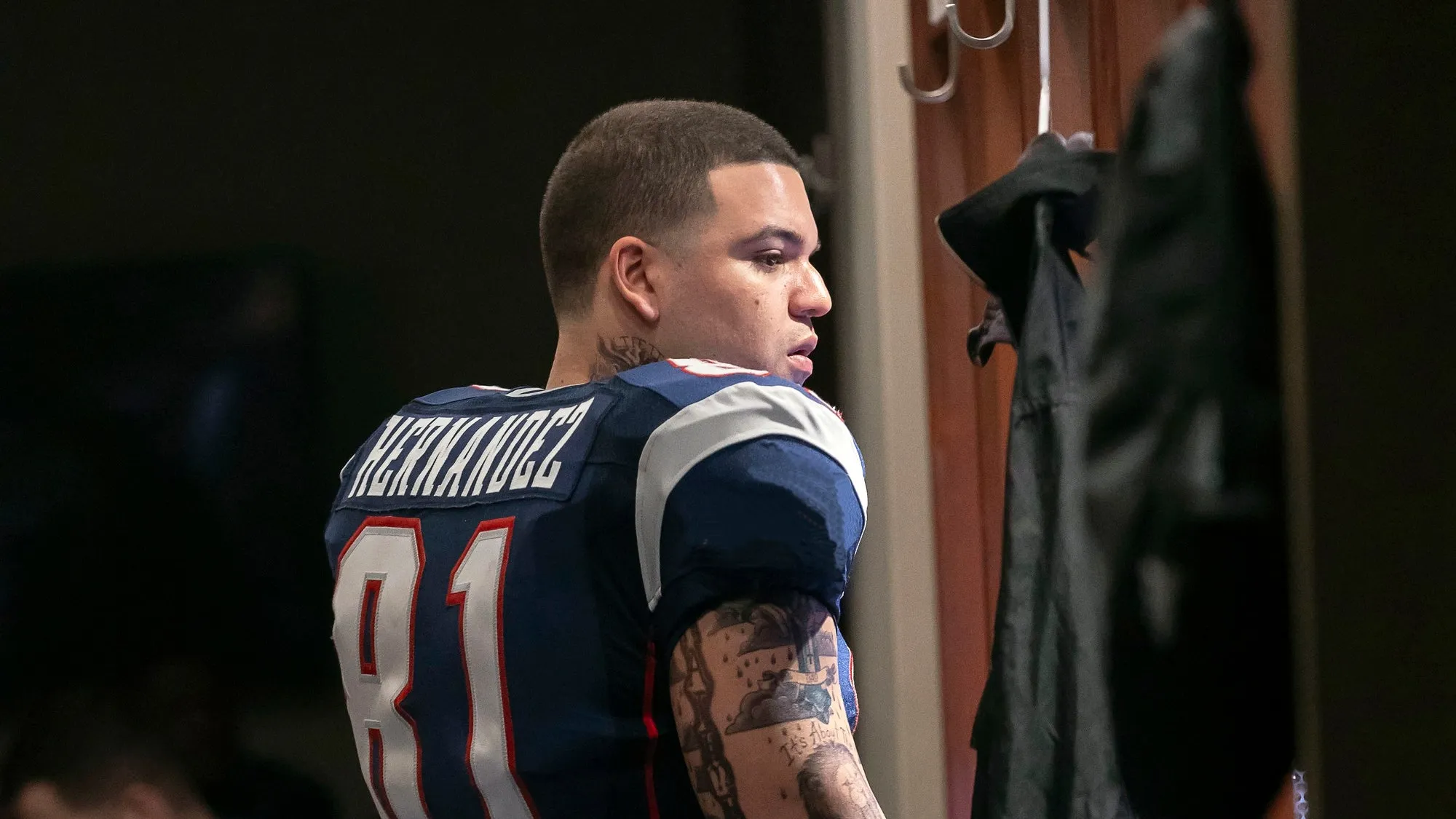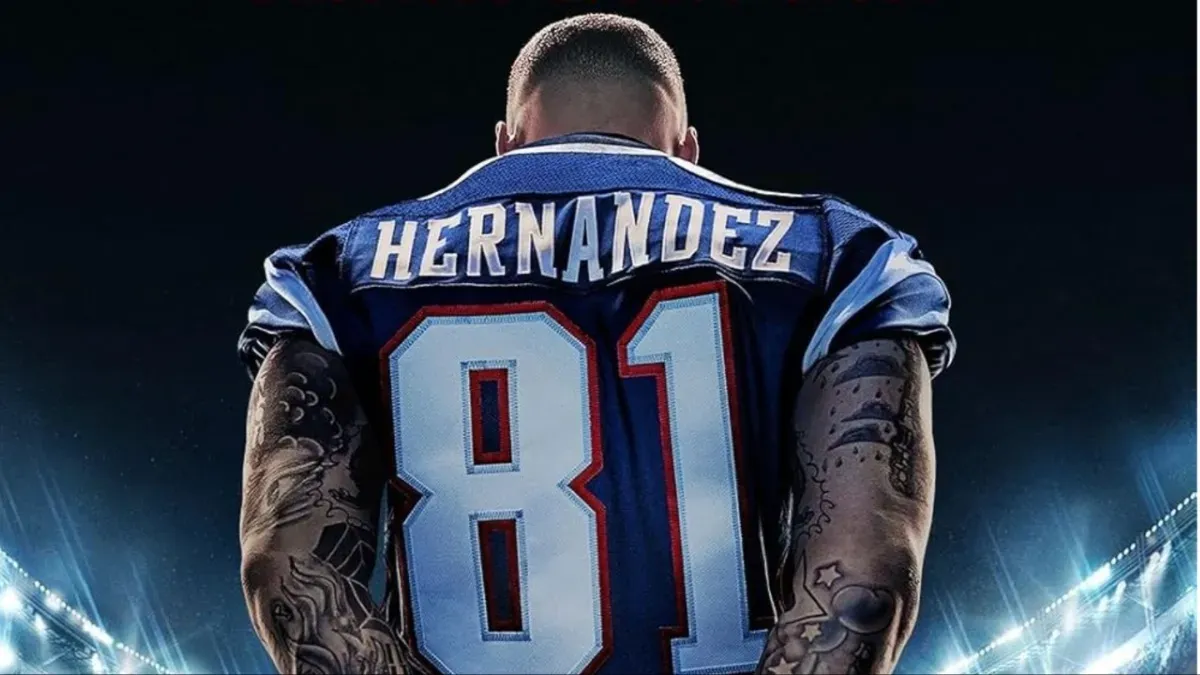From humble beginnings to NFL stardom and a shocking fall from grace, Aaron Hernandez’s story is tragic. The FX limited series American Sports Story focuses on Hernandez, a tight end who rose to fame with the New England Patriots before his world came crumbling down following a series of unspeakable crimes.
Produced by megaproducer Ryan Murphy and premiering in September 2022, the 10-episode season recounts Hernandez’s journey from his youth in Connecticut to being drafted by the Patriots at age 22. Along the way, we see him battle inner demons, troubled relationships, and the severe consequences that can stem from unchecked mental health issues left to fester in the high-pressure world of professional sports.
Josh Rivera gives a tour-de-force performance as Hernandez, capturing both his athlete’s charisma and deep well of volatility and turmoil. Through nuanced scenes of Hernandez the beloved player and Hernandez the deeply disturbed man, the story aims to shed light on how childhood traumas, toxic environments, and an undiagnosed brain injury combined to set Hernandez on a destructive path with heartbreaking results.
For those looking to gain a deeper understanding of this still-perplexing case, American Sports Story takes viewers on a compelling if harrowing look at Hernandez’s dramatic rise and fall.
Hernandez’s Complex Journey
Aaron Hernandez’s story is a multifaceted one that takes viewers on a journey through his rise and fall. Born and raised in Bristol, Connecticut, Hernandez came from humble beginnings but showed immense football talent from a young age. He dreamed of following in the footsteps of his father Dennis, a former college player whose career was cut short due to legal trouble.
Dennis placed intense pressure on Hernandez and his older brother DJ to succeed at football. While his strict parenting style came from a place of wanting to avoid mistakes, it added trauma to Aaron’s childhood. He grew close to his mother but lived in fear of disappointing his father’s towering expectations. These family dynamics were the first of many complex factors that shaped Hernandez into the troubled man he became.
In high school, Hernandez’s skills as a tight end earned him national recognition and numerous Division One offers. He accepted a scholarship to attend the University of Florida, coached by Urban Meyer. Though a stellar player under Meyer, Hernandez also struggled with substance abuse and brushes with law enforcement that were too often swept under the rug by a program valuing wins over player welfare.
It was at UF that Hernandez met people who would remain in his inner circle, for better or worse, including devout Christian teammate Tim Tebow. He also buried deeper the secrets of his sexuality in an intolerant era and environment. After two years, Hernandez entered the NFL draft, selected by the New England Patriots in the fourth round.
There, Hernandez was guided by legendary coach Bill Belichick, who saw his potential but treated him as expendable. The Patriots organization shielded Hernandez from accountability for concerning behavior. Meanwhile, the head traumas sustained on the field were taking their toll, as evidenced by an extreme case of CTE discovered after his death.
Overall, American Sports Story aims to understand how Hernandez’s upbringing, the football culture he was part of, and his closeted identity collided into tragic consequences. At the center is Josh Rivera’s raw, nuanced portrayal of a man torn between immense promise and personal demons he could never overcome.
Hernandez’s Truth: Josh Rivera’s Captivating Performance
Stepping into Aaron Hernandez’s troubled shoes was an immense challenge, but Josh Rivera was up to the task in his breakout leading role. From the first moments of American Sports Story, Rivera commands the screen with his raw portrayal of a man wrestling with inner demons.
He imbues Hernandez with a disarming charm that makes audiences understand his allure, on full display when interacting with fans or flirting with romantic interests. But beneath Rivera’s steady gaze lies a volatility that could explode at any second.
In pivotal scenes, Rivera layers in nuance as tiny shifts portray Hernandez switching between smiles and tears, opening up then shutting down, bursting with boyish enthusiasm one instant and brooding anger the next. These glimpses at the turmoil within stay with viewers long after, raising difficult questions about Hernandez’s psychology.
Physically, Rivera is nearly indistinguishable from Hernandez, from teenage hopeful to burly NFL star. But more than looks, Rivera fully inhabits Hernandez’s essence through intoxicating smiles and fearsome rages alike. He makes the man’s downfall deeply unsettling yet somehow understandable.
Rivera also conveys Hernandez’s hidden fragility, bubbling to the surface in vulnerable flashes, suggesting the emotional toll of hiding his sexuality. Behind closed doors, quiet tears flow freely, illuminating Hernandez’s latent sensitivity.
Through it all, Rivera transforms Hernandez from tabloid sensation into a complex human navigating trauma, unmet needs, and mental instability in an unforgiving industry. It’s a mesmerizing, soul-baring performance that brings truth and empathy to a real-life tragedy.
Capturing the Cost of Competition
American Sports Story takes an impressive approach to visualizing the physical toll of football. Directors blend real game footage seamlessly into dramatic reenactments of hard hits. This conveys the brutality of Hernandez’s playing days while maintaining suspense.
Key scenes like shootouts are rebuilt with chilling precision, placing viewers in the midst of high-stakes violence. Through it all, tight close-ups of Hernandez showcase the character’s fluctuating psyche.
We watch distress contort Rivera’s face in real time, gaining entry into Hernandez’s deteriorating mental state. His pained, sometimes furious expressions leave an indelible mark.
On the field, the directors cut between broadcast replays and first-person perspectives to make staged collisions feel visceral. We experience the bone-jarring impact Hernandez endured for years, giving new insight into how each blow affected his mental wellbeing.
Across ten dense hours, a deliberate editing pace methodically links moments in Hernandez’s life, for better or worse. Though some criticize repetitiveness in framing Hernandez, focusing so much on one individual tracks the downward path of a man hurtling towards self-destruction.
Ultimately, the directors overcome potential visual limitations to immerse audiences in Hernandez’s harrowing experience, both as a gifted athlete and tragic casualty of institutions that demanded his body but not his humanity.
Shades of Gray
While Aaron Hernandez takes center stage, strong supporting players help flesh out his world. Lindsay Mendez brings compassion to cousin Tanya, the sole stable female influence. Jaylen Barron meanwhile breaks hearts as Hernandez’s doomed fiancée Shayanna.
Vincent Laresca terrifyingly portrays Dennis Hernandez, inflicting abuse while demanding perfection. His actions plague Aaron for life. Tony Yazbeck also shines as the charming yet enabling Urban Meyer, more image than soul.
Not all nails have the nuanced tone, however. Patrick Schwarzenegger struggles to embody spiritual superstar Tim Tebow beyond surface traits. Meanwhile, others feel underdeveloped or used more as plot devices.
Still, complex character moments like Tanya softening Terry’s harshness enrich our understanding. Effectively vile performances illuminate Hernandez’s psychology and upbringing. But subtler parts could have further fleshed out Hernandez’s pressures and why some broke bad while he broke worst.
Where certain performers bring individuals to life, a fuller dimension to some might have deepened our grasp of Hernandez’s tragic descent within contexts shaping who managed to rise above or sink further into darkness.
Hernandez’s Enduring Lessons
On the whole, American Sports Story offers a compassionate retelling that sheds light on Hernandez’s path to tragedy. While sometimes heavy-handed, it accomplishes more than rehashing sordid details.
Zicherman deserves praise for his unflinching examination of complex issues that shaped Hernandez—from childhood abuse and lost role models to the rejection of careers cut short due to head injuries or sexuality.
Through Rivera’s nuanced lead, the miniseries reminds us that even revered public figures contain multitudes, and internal torments often go unnoticed until violence emerges. More than blame, it conveys sympathy while avoiding absolution.
Revisiting this decade-old case seems justified by highlighting football’s continuing duty to player welfare and the cultural costs of closeting identities. Hernandez’s crimes still loom large, but so do the societal cracks that allowed his downfall.
While not revolutionizing its genre, American Sports Story revives empathy for those whose passions and pressures can morph from blessings to self-destruction. Its heartfelt efforts elevate Hernandez beyond sensationalism into cautionary tragedy, fueled by timely issues still requiring attention.
In re-experiencing one man’s preventable collapse, the miniseries leaves viewers with compassion and motivation to confront society’s role in social demons that fester in neglect. For that impactful message, American Sports Story deserves recognition and discussion.
The Review
American Sports Story: Aaron Hernandez
American Sports Story delivers a thoughtful, nuanced recounting of Aaron Hernandez's rise and fall that serves as a reminder of the societal factors enabling human tragedies. Anchored by Josh Rivera's tour-de-force lead performance, the miniseries navigates complex issues around identity, mental health, and institutional responsibilities with earnest empathy. Though sometimes blunt, it attains its goal of humanizing real-life figures while shining needed light on issues still requiring attention.
PROS
- Nuanced lead performance by Josh Rivera
- Thorough examination of intersecting social issues that impacted Hernandez
- A compassionate tone avoids solely sensationalizing true events.
- Timely lessons on football culture, closeting, and mental health support
CONS
- Formulaic nature lacks reinventing anthology genre
- Occasional heavy-handed scenarios and dialogue
- Fails to offer significantly new analysis for those familiar with the case




















































